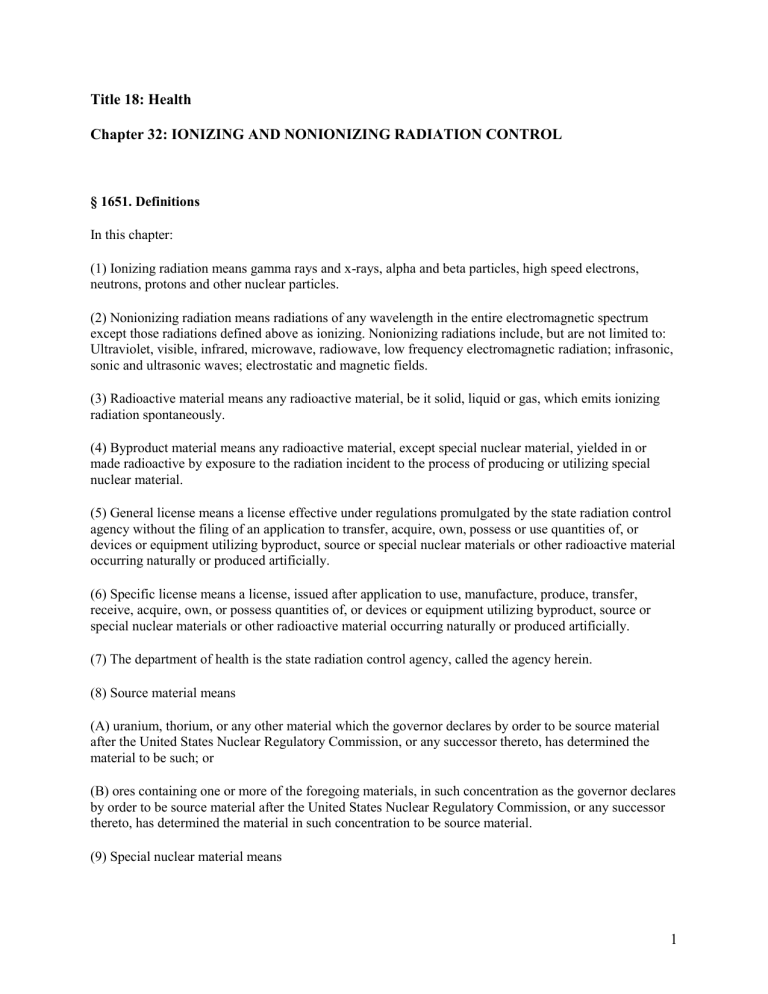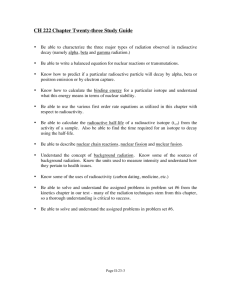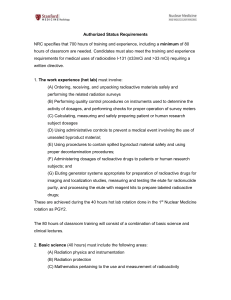VT. Stat. tit. 18, §1651 et seq.doc

Title 18: Health
Chapter 32: IONIZING AND NONIONIZING RADIATION CONTROL
§ 1651. Definitions
In this chapter:
(1) Ionizing radiation means gamma rays and x-rays, alpha and beta particles, high speed electrons, neutrons, protons and other nuclear particles.
(2) Nonionizing radiation means radiations of any wavelength in the entire electromagnetic spectrum except those radiations defined above as ionizing. Nonionizing radiations include, but are not limited to:
Ultraviolet, visible, infrared, microwave, radiowave, low frequency electromagnetic radiation; infrasonic, sonic and ultrasonic waves; electrostatic and magnetic fields.
(3) Radioactive material means any radioactive material, be it solid, liquid or gas, which emits ionizing radiation spontaneously.
(4) Byproduct material means any radioactive material, except special nuclear material, yielded in or made radioactive by exposure to the radiation incident to the process of producing or utilizing special nuclear material.
(5) General license means a license effective under regulations promulgated by the state radiation control agency without the filing of an application to transfer, acquire, own, possess or use quantities of, or devices or equipment utilizing byproduct, source or special nuclear materials or other radioactive material occurring naturally or produced artificially.
(6) Specific license means a license, issued after application to use, manufacture, produce, transfer, receive, acquire, own, or possess quantities of, or devices or equipment utilizing byproduct, source or special nuclear materials or other radioactive material occurring naturally or produced artificially.
(7) The department of health is the state radiation control agency, called the agency herein.
(8) Source material means
(A) uranium, thorium, or any other material which the governor declares by order to be source material after the United States Nuclear Regulatory Commission, or any successor thereto, has determined the material to be such; or
(B) ores containing one or more of the foregoing materials, in such concentration as the governor declares by order to be source material after the United States Nuclear Regulatory Commission, or any successor thereto, has determined the material in such concentration to be source material.
(9) Special nuclear material means
1
(A) plutonium, uranium 223, uranium enriched in the isotope 233 or in the isotope 235, and any other material which the governor declares by order to be special nuclear material after the United States
Nuclear Regulatory Commission, or any successor thereto, has determined the material to be such, but does not include source material; or
(B) any material artificially enriched by any of the foregoing, but does not include source material. (1967,
No. 27, § 1; amended 1977, No. 83, § 1.)
§ 1652. State radiation control
(a) The commissioner of health may designate the director of occupational health as the individual who shall perform the functions vested in the agency.
(b) The agency shall, for the protection of the occupational and public health and safety, develop programs for the control of ionizing and non-ionizing radiation compatible with federal programs for regulation of byproduct, source and special nuclear materials.
(c) The agency may adopt, amend and repeal rules under chapter 25 of Title 3:
(1) which may provide for licensing and registration for the control of sources of ionizing radiation;
(2) for the control and regulation of sources of non-ionizing radiation.
(d) The agency shall advise, consult and cooperate with other agencies of the state, the federal government, other states and interstate agencies, political subdivisions, industries, and with groups concerned with control of sources of ionizing and non-ionizing radiation. (1967, No. 27, § 2; amended
1977, No. 83, § 2.)
§ 1653. Federal-state agreements
(a) The governor, on behalf of the state of Vermont, may enter into agreements with the federal government providing for discontinuance of certain of the federal government's responsibilities with respect to byproduct, source and special nuclear materials and the assumption thereof by the state of
Vermont.
(b) In the event of such agreement,
(1) The agency shall provide by rule for general or specific licensing of byproducts, source, special nuclear materials or devices or equipment utilizing such materials. The rule shall provide for amendment, suspension or revocation of licenses.
(2) The agency shall be authorized to exempt certain byproduct, source or special nuclear materials or kinds of uses or users from the licensing or registration requirements set forth in this section when the agency makes a finding that the exemption of such materials or kinds of uses or users will not constitute a significant risk to the health and safety of the public.
(3) Any person having a license immediately before the effective date of an agreement under subsection
(a) of this section from the federal government or agreement state relating to byproduct material, source material or special nuclear material and which on the effective date of this agreement is subject to the
2
control of this state shall be considered to have a like license with the state of Vermont until the expiration date specified in the license from the federal government or agreement state or until the end of the ninetieth day after the person receives notice from the agency that the license will be considered expired.
(4) The agency shall require each person who possesses or uses byproduct, source or special nuclear materials to maintain records relating to the receipt, storage, transfer or disposal of such materials and such other records as the agency may require subject to such exemptions as may be provided by rule.
(5) Violations
(A) It shall be unlawful for any person to use, manufacture, produce, transport, transfer, receive, acquire, own or possess any byproduct, source or special nuclear material unless licensed by or registered with the agency in accordance with the provisions of this chapter.
(B) The agency shall have the authority in the event of an emergency to impound or order the impounding of byproduct, source and special nuclear materials in the possession of any person who is not equipped to observe or fails to observe the provisions of this chapter or any rules or regulations issued thereunder.
(6) The provisions of this section relating to the control of byproduct, source and special nuclear materials shall become effective on the effective date of an agreement between the federal government and this state as provided in section 1656 of this title. (1967, No. 27, § 3.)
§ 1654. Inspection
The agency or its duly authorized representatives may enter at all reasonable times upon any private or public property for the purpose of determining whether or not there is compliance with or violation of this chapter and rules and regulations issued thereunder, except that entry into areas under the jurisdiction of the federal government shall be made only with the concurrence of the federal government or its duly designated representative. (1967, No. 27, § 4.)
§ 1655. Hearings and judicial review
(a) In any proceeding under this chapter for the issuance or modification of rules relating to control of byproducts, source and special nuclear materials; or for granting, suspending, revoking or amending any license; or for determining compliance with or granting exemptions from rules and regulations of the agency, the agency shall hold a public hearing upon the request of any person whose interest may be affected by the proceeding, and shall admit any such person as a party to the proceeding, subject to the emergency provisions in subsection (b).
(b) Whenever the agency finds that an emergency exists requiring immediate action to protect the public health and safety, the agency may, without notice or hearing, issue a regulation or order reciting the existence of the emergency and requiring that such action be taken as is necessary to meet it.
Notwithstanding any provisions of this chapter, the regulation or order shall be effective immediately.
Any person to whom the regulation or order is directed shall comply therewith immediately, but on application to the agency shall be afforded a hearing within ten days. On the basis of the hearing, the emergency regulation or order shall be continued, modified or revoked within ten days after the hearing.
3
(c) Any final order entered in any proceeding under subsections (a) and (b) above shall be subject to judicial review in the superior court. (1967, No. 27, § 5; amended 1997, No. 161 (Adj. Sess.), § 11, eff.
Jan. 1, 1998.)
§ 1656. Injunction proceedings
Whenever, in the judgment of the agency, any person has engaged in or is about to engage in any acts or practices which constitute or will constitute a violation of any provision of this chapter, or any rule issued thereunder, the attorney general shall make application to the appropriate court for an order enjoining such acts or practices, or for an order directing compliance, and upon a showing by the agency that such person has engaged or is about to engage in any such acts or practices, a permanent or temporary injunction, restraining order, or other order may be granted. (1967, No. 27, § 6.)
§ 1657. Penalties
Any person who violates this chapter or rules in effect pursuant thereto shall, upon conviction thereof, be imprisoned not more than six months, or fined not more than $500.00 or less than $100.00, or be both imprisoned and fined. (1967, No. 27, § 7.)
§ 1658. Repealed. 1977, No. 83, § 5.
4



